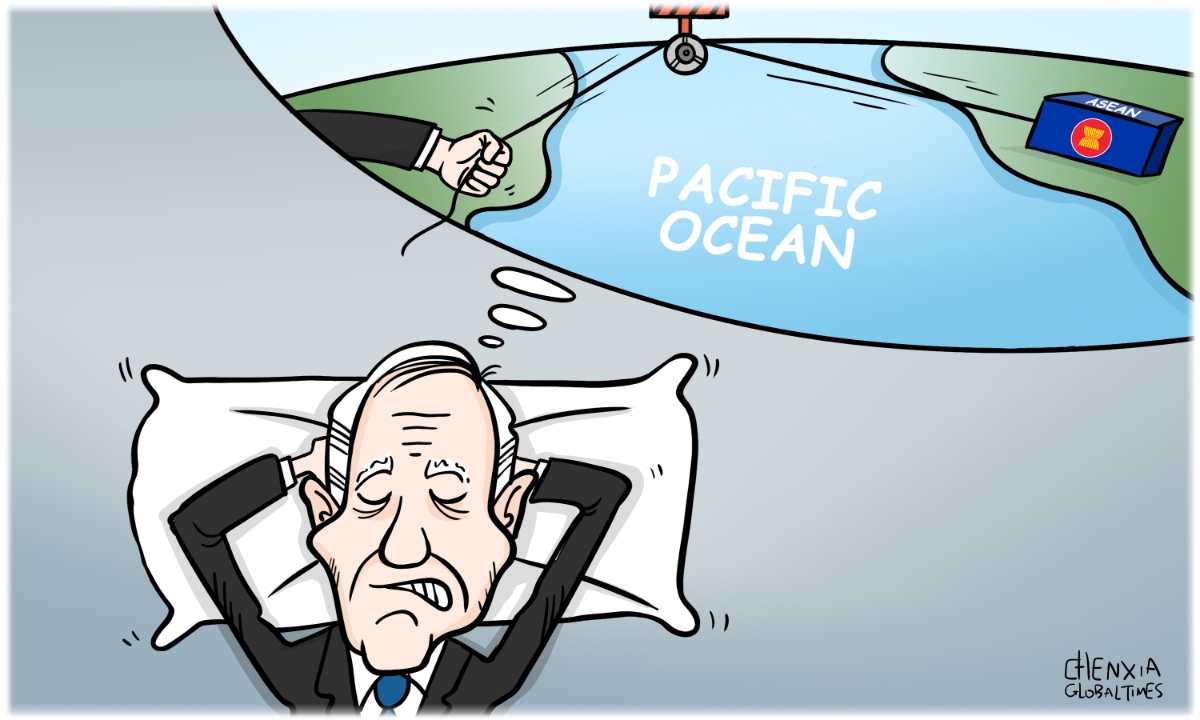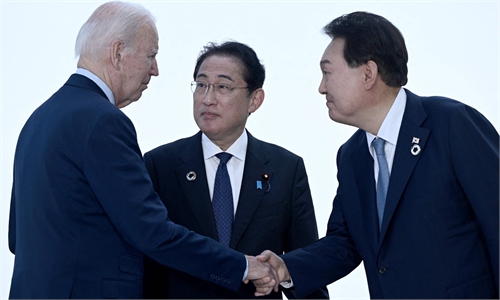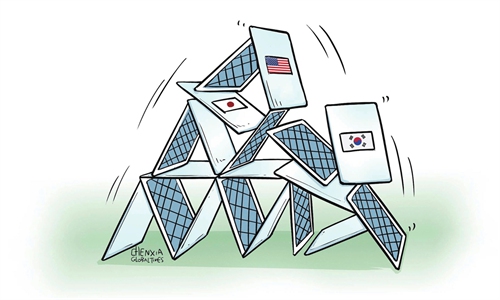The Camp David summit wants to forcefully add drama to ASEAN: Global Times editorial

Illustration: Chen Xia/Global Times
The US-Japan-South Korea Camp David summit was completed in just half a day, but its impact on world peace and regional stability continues to ferment. International public opinion was surprised to note that the joint statement signed by the three parties, titled "The Spirit of Camp David," extensively mentioned the ASEAN and Pacific island countries, and talked about the South China Sea issue "using their strongest language yet." Even American experts interviewed by Western media expressed "surprise" at the arrangement in the statement.One of the three countries, the US, is purely an extra-regional country, while the other two are Northeast Asian countries. In a gathering that promotes a "new cold war," the fact that the three countries focused on the situation in another region cannot be simply dismissed as "meddling in others' affairs." The general impression on the summit in international public opinion is "addressing the challenge from China." During the joint press conference after the summit, US President Joe Biden ambiguously stated that "This summit was not about China… But it did come - China obviously came up."
In a sense, the "Spirit of Camp David" is ridiculous. It was originally a feast set by the US for Japan and South Korea, hoping to hand them the knife of the "new cold war." But neither Japan nor South Korea took it, and in the end, the three countries together tried to pass the knife to a third party, the ASEAN and Pacific island countries, who were not present at the summit and had no connection to it. The US, Japan, and South Korea, through this document that was supposed to guide their cooperation, called out to ASEAN and Pacific island countries, expressing their willingness to support them in confronting China. Did the US, Japan, and South Korea consult with ASEAN countries and Pacific island countries in advance about this forced drama? Did they ask for their consent?
While the three countries publicly avoid China, they secretly put ASEAN and the Pacific island countries on the front line of containing China, using them as pawns. The "Spirit of Camp David" is filled with malicious calculations to turn these countries into cannon fodder for the "new cold war." In the earlier years, there were some regional countries which hoped to "play balance" between major powers to strive for more resources. In recent years, more countries are expressing concerns about conflicts between major powers. In ASEAN, including traditional security ally of the US, Singapore, and countries like Vietnam that the US is trying to win over, have expressed on multiple occasions that they are unwilling to "take sides," while Pacific island countries have been more straightforward, saying that they "don't have any problems or concerns" with regards to their relations with China.
The US has been trying to draw ASEAN to its side for a long time, and it is still stepping up efforts to do so, which indicates that its previous efforts were not successful. Even if it manages to bring Japan and South Korea on board now, it cannot change the ultimate outcome of failure. The fundamental reason is that the US has ignored the history and reality of ASEAN and disregarded the regional countries' insistence on independent and autonomous diplomacy. ASEAN countries have the most profound negative memories of the Cold War and are highly vigilant against attempts to start a "new cold war." During the Cold War, the US intervened in the domestic politics of countries like Vietnam and Cambodia, instigated proxy wars, and even directly got involved in, bringing the people of the region historical wounds that are difficult to heal. This region is one of the most averse to major powers engaging in group politics and camp confrontation.
No matter how fancy the bottle the US presents, as long as it pours out the old wine of the Cold War, no one will be willing to drink it all. The Camp David summit has had a strong "new cold war" color since its design, and it should be easy to predict the attitude of countries in the Asia-Pacific region toward it. It is clear to discerning people that when it comes to an ASEAN-centered approach, there is a vast difference between China and the US. The US attempts to place ASEAN at the center of the "Indo-Pacific Strategy," which is essentially putting ASEAN on the fire; while China truly regards ASEAN as the center of regional cooperation and is a firm practitioner of cooperation for win-win outcomes with ASEAN. The contrast between the words and actions of the US itself, combined with the actual comparison between China and the US, provides the most vivid display for ASEAN and other countries around the world.
It is not difficult to judge whether the US, Japan, and South Korea truly "support" ASEAN and Pacific island countries. The key lies in whether their actions have promoted local livelihood development, created new development opportunities for those countries, and contributed to creating a more stable external development environment for them. Judging from the divisive and confrontational remarks displayed by the "Spirit of Camp David," the "support" of the US, Japan, and South Korea is clearly hypocritical. Regional countries need to be more vigilant about this.


